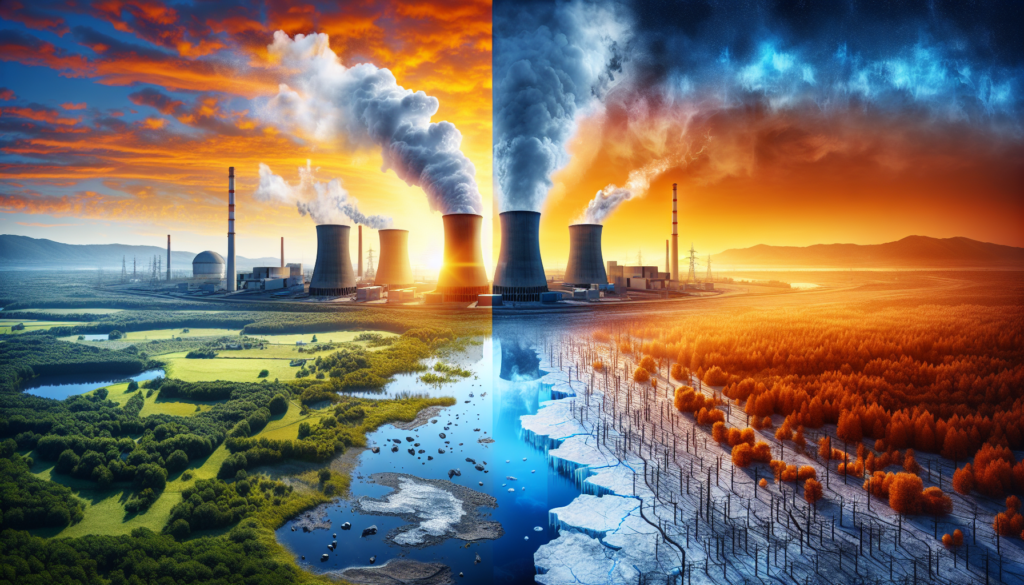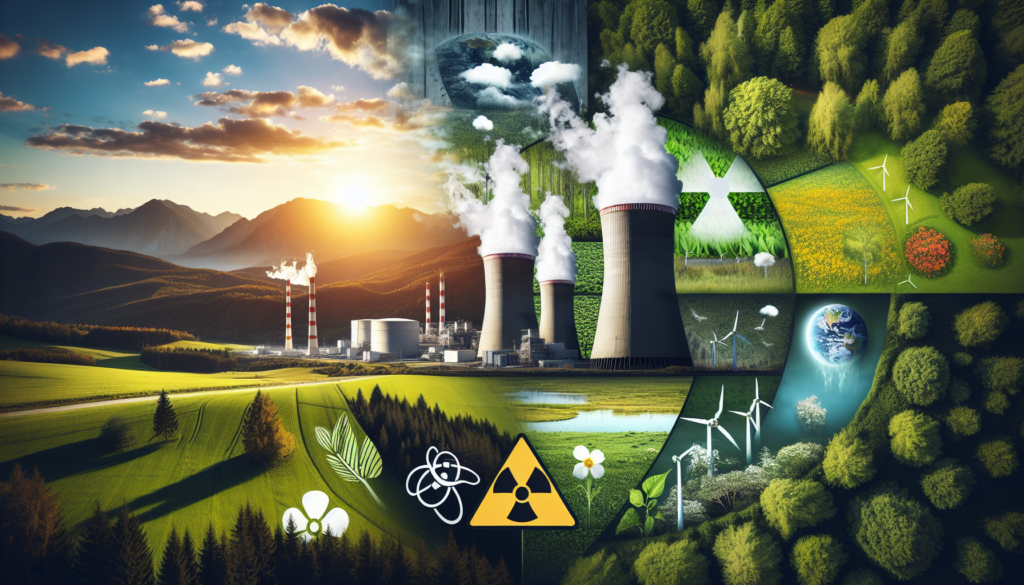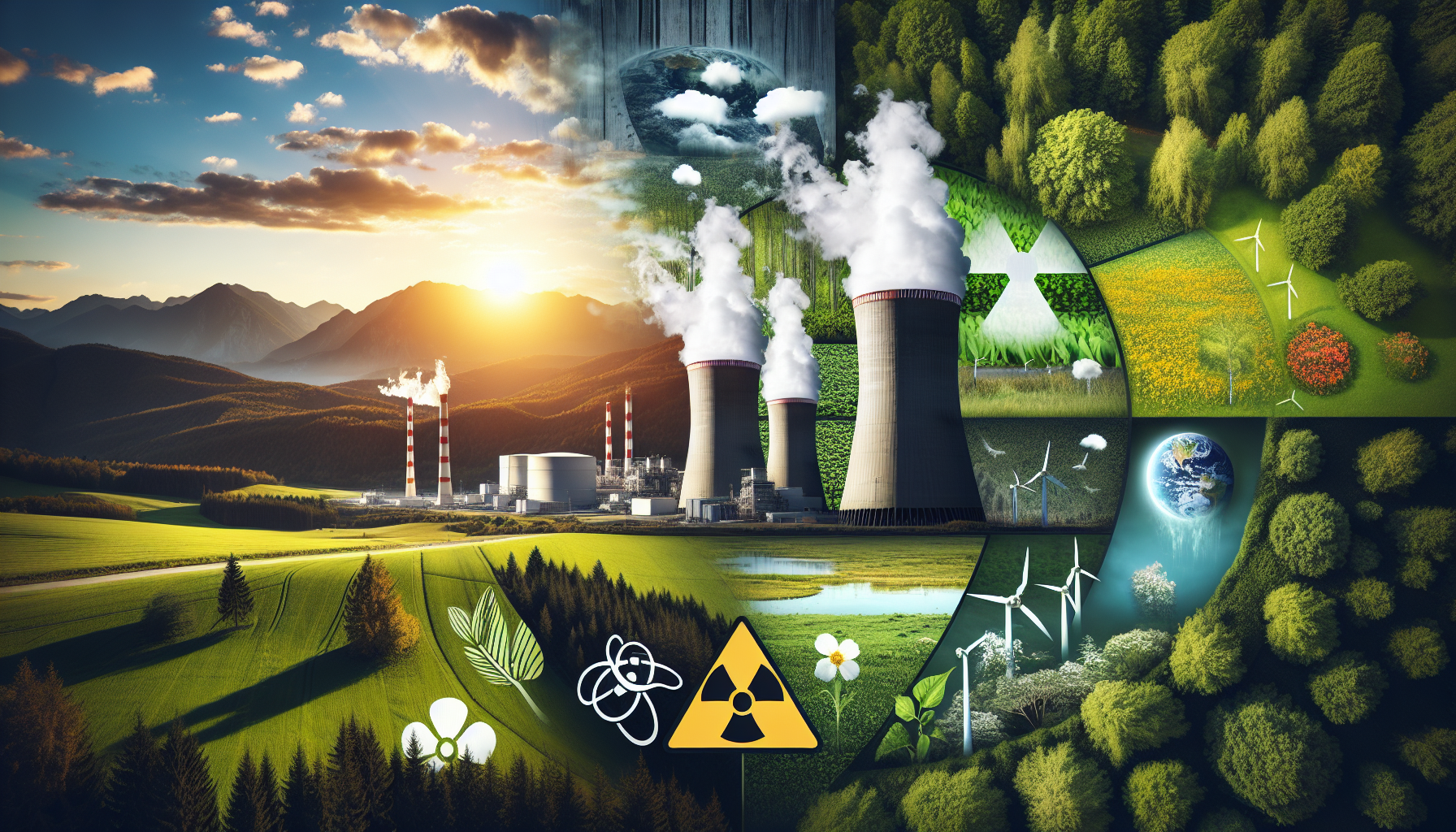Nuclear energy has long been a topic of debate when it comes to its impact on the environment. On one hand, nuclear power is seen as a clean and efficient source of electricity generation, significantly reducing greenhouse gas emissions. However, concerns about radioactive waste disposal and the potential for catastrophic accidents have prompted a closer examination of the pros and cons of this powerful energy source. In this article, we will explore the various arguments surrounding nuclear energy and its effects on the environment, providing a balanced perspective on this complex issue.

Pros of Nuclear Energy
Low Greenhouse Gas Emissions
One of the major advantages of nuclear energy is its low greenhouse gas emissions. Compared to traditional fossil fuels such as coal and oil, nuclear power plants release virtually no carbon dioxide (CO2) or other pollutants into the atmosphere. This makes nuclear energy a clean energy option that contributes significantly to reducing air pollution and combating climate change. By generating electricity through nuclear power, we can significantly reduce our carbon footprint and mitigate the environmental impact of our energy consumption.
High Energy Density
Nuclear energy boasts an incredibly high energy density, meaning that a relatively small amount of fuel can produce a significant amount of energy. For instance, a single uranium fuel pellet, which is about the size of a fingertip, has the energy equivalent of about 150 gallons of oil. This compactness makes nuclear power an excellent choice for areas where space is limited or where large-scale power generation is necessary. With its high energy density, nuclear energy provides a more efficient and effective source of power compared to other alternatives.
Reliable Power Generation
In terms of power generation, nuclear energy is exceptionally reliable. Unlike renewable energy sources like solar or wind power, which are subject to weather conditions and intermittency issues, nuclear power plants can continuously produce electricity 24/7. This predictability makes nuclear energy a suitable option for baseload power, meeting the constant demand for electricity. Additionally, nuclear power plants have minimal outages and downtime, ensuring a stable and uninterrupted power supply for communities and industries.
Cost-Competitive
Nuclear energy also stands out as a cost-competitive option for electricity generation. While the initial capital investment for building a nuclear power plant can be high, the operational costs of nuclear energy are relatively low. This allows for stable energy prices, reducing the vulnerability to fluctuations in fuel prices. Moreover, nuclear power plants provide an opportunity for countries to reduce their dependence on fuel imports, thus enhancing energy security and boosting local economies.
Job Creation and Economic Growth
The nuclear energy sector holds great potential for job creation and economic growth. Building and maintaining nuclear power plants require a skilled workforce, offering employment opportunities for engineers, technicians, and various other professionals. Moreover, the nuclear industry stimulates value chain development, as it relies on the production of specialized equipment, materials, and services. This, in turn, attracts investments and stimulates economic growth in the surrounding areas. By embracing nuclear energy, countries can harness its economic benefits and create a sustainable future for their communities.
Cons of Nuclear Energy
Nuclear Waste Disposal
One of the most significant drawbacks of nuclear energy is the challenge of nuclear waste disposal. Nuclear power generation produces radioactive waste that remains hazardous for thousands of years. The long-term storage and management of this waste pose considerable challenges. While there are methods for storing nuclear waste in underground repositories, such as deep geological repositories, concerns over leakage, transportation risks, and public perception raise questions about the future of nuclear waste disposal.
Accidents and Safety Concerns
The accidents that have occurred in the history of nuclear energy, most notably the Chernobyl and Fukushima disasters, have raised valid safety concerns. While these incidents are rare, the potential for nuclear meltdowns and catastrophic accidents cannot be ignored. The consequences of a major nuclear accident can lead to severe environmental contamination and have long-lasting impacts on human health. Safety measures and strict regulations are necessary to minimize the risks associated with nuclear power, ensuring the safety of both workers and nearby communities.
Limited Fuel Availability
Another limitation of nuclear energy is the limited availability of fuel. Uranium, the primary fuel used in nuclear power plants, is a finite resource. While there are significant uranium deposits around the world, the extraction and processing of uranium ores can be environmentally disruptive and energy-intensive. As the demand for nuclear energy continues to rise, concerns about the future availability of uranium resources arise. This limitation emphasizes the need for a transition towards more sustainable and renewable energy sources.
Environmental Impact of Uranium Mining
The process of mining uranium presents its own environmental challenges. Uranium mining can lead to habitat destruction, water pollution, and soil contamination. It also poses risks to wildlife, endangering local ecosystems and biodiversity. Furthermore, the transportation of uranium ore from mining sites to processing facilities may require significant energy consumption and generate greenhouse gas emissions. While measures can be taken to minimize the environmental impact of uranium mining, it remains a concern that needs to be addressed in order to mitigate the overall environmental footprint of nuclear energy.
Non-Renewable Source
Lastly, nuclear energy is considered a non-renewable source of energy since it relies on a finite resource – uranium. Unlike renewable energy sources such as solar, wind, or hydroelectric power, which can be harnessed indefinitely, nuclear power relies on the availability of uranium reserves. As these reserves are depleted over time, the sustainability of nuclear energy becomes a pressing issue. To ensure a truly sustainable future, it is crucial to transition towards renewable energy sources that can provide an infinite supply of clean energy.
Low Greenhouse Gas Emissions
Nuclear Power vs. Fossil Fuels
When comparing nuclear power to traditional fossil fuels, the difference in greenhouse gas emissions is striking. Fossil fuel combustion releases CO2, a major contributor to global warming and climate change. In contrast, nuclear power plants do not emit CO2 during their operation. By replacing fossil fuel-based electricity generation with nuclear power, we can significantly reduce our carbon emissions and combat the detrimental effects of climate change.
Reduced Air Pollution
In addition to its low greenhouse gas emissions, nuclear energy also reduces other forms of air pollution. Fossil fuel power plants release pollutants such as sulfur dioxide, nitrogen oxides, and particulate matter, which have adverse effects on both human health and the environment. Nuclear power plants, on the other hand, do not produce these harmful pollutants, thereby improving air quality and reducing respiratory diseases. By adopting nuclear energy, we can create a cleaner and healthier environment for future generations.
Addressing Climate Change
Nuclear energy plays a crucial role in addressing the challenges posed by climate change. With rising global temperatures, the need for low-carbon energy sources becomes increasingly urgent. Nuclear power provides a reliable and large-scale solution to reduce greenhouse gas emissions. By embracing nuclear energy and transitioning away from fossil fuels, we can make significant progress in mitigating climate change and securing a sustainable future for our planet.
High Energy Density
Compact Fuel Source
One key advantage of nuclear energy is its high energy density. The energy stored in a small amount of nuclear fuel is tremendous. For example, a single pound of enriched uranium contains approximately the same amount of energy as three million pounds of coal. This compactness allows nuclear power plants to produce a large amount of electricity from a relatively small physical footprint, making it an ideal choice for areas with limited space or high population densities.
Efficient Power Production
The high energy density of nuclear fuel also contributes to efficient power production. Nuclear reactors can convert a significant portion of the energy stored in the fuel into usable electricity. This efficiency is crucial in maximizing resource utilization and minimizing waste. By generating electricity efficiently, nuclear power plants help conserve natural resources and reduce environmental impacts associated with energy production.
Suitable for Baseload Power
Another benefit of high energy density is that nuclear power is well-suited for baseload power generation. Baseload power refers to the constant minimum amount of electricity needed to meet the demands of a community or an industry. Nuclear power plants can operate continuously, providing a stable and reliable source of electricity to meet baseload demand. This predictability and reliability make nuclear energy an indispensable component of a well-balanced energy mix.

Reliable Power Generation
Continuous and Predictable Output
Reliability is one of the defining characteristics of nuclear energy. Unlike renewable sources like solar or wind power, which are subject to weather fluctuations, nuclear power plants generate electricity consistently and predictably. The ability to maintain a steady output of electricity is essential for industries, hospitals, and other critical infrastructure that require uninterrupted power supply. Nuclear energy’s reliable power generation ensures a stable and resilient electricity grid.
Minimal Outages and Downtime
Power outages can have severe consequences for communities and industries. Unlike other forms of electricity generation, nuclear power plants have a relatively low risk of unplanned outages or downtime. This is due to the robust design of nuclear reactors and the stringent safety measures in place to prevent accidents. The high reliability of nuclear power plants translates into fewer disruptions in electricity supply, reducing losses in productivity and improving the overall quality of life.
Long Operational Lifespan
Nuclear power plants have a long operational lifespan, often exceeding 40 years. This longevity allows for stable power generation for several decades, ensuring an extended period of energy security. With proper maintenance and upgrades, nuclear reactors can even operate beyond their original design lifespan. This long-term operational capability provides reliability, allowing for efficient planning and investment in energy infrastructure.
Cost-Competitive
Economic Viability
While the initial costs of building a nuclear power plant can be substantial, the overall economic viability of nuclear energy is often favorable. The operational costs of nuclear power plants, including fuel costs, are relatively low compared to other sources of electricity. Furthermore, long operational lifespans and the continuous nature of power generation contribute to the cost-effectiveness of nuclear energy. Although the upfront investment may seem significant, the long-term economic benefits of utilizing nuclear power often outweigh the initial costs.
Stable Energy Prices
Nuclear energy offers stable energy prices, reducing the vulnerability to fuel price fluctuations. Unlike fossil fuels, which experience price volatility due to geopolitical factors and limited reserves, nuclear fuel costs remain relatively stable once a plant is operational. This stability can provide energy consumers with reliable and predictable electricity bills, creating a more secure financial environment for businesses and households.
Reduced Dependence on Fuel Imports
By embracing nuclear energy, countries can reduce their dependence on imported fossil fuels. Relying on domestically produced nuclear fuel mitigates the risks associated with fuel price fluctuations and enhances a country’s energy security. Moreover, promoting a localized nuclear industry stimulates local economies, fosters technological advancements, and creates job opportunities. Reduced dependence on fuel imports through nuclear power can lead to greater energy independence and strengthen national economies.
Job Creation and Economic Growth
Employment Opportunities
The nuclear energy sector offers a wide range of employment opportunities that contribute to job creation and economic growth. Building and maintaining nuclear power plants require a skilled and diverse workforce, including engineers, technicians, scientists, and various other professionals. These jobs offer high pay and often require specialized training, creating stable and rewarding career paths. Furthermore, nuclear power plant projects stimulate job growth in local communities, supporting ancillary services, such as construction, transportation, and tourism.
Value Chain Development
The nuclear industry’s supply chain extends beyond the construction and operation of power plants. It encompasses the manufacturing and maintenance of specialized equipment, the production of nuclear fuel, waste management, and other related activities. Developing a robust nuclear value chain promotes domestic industries, leading to the growth of manufacturing capabilities and technological expertise. This value chain development further contributes to economic growth and innovation within the nuclear energy sector.
Investment Attraction
The investment potential in the nuclear energy sector is significant. Building and operating nuclear power plants require substantial capital, which often involves partnerships between private companies and governments. These investments create opportunities for businesses, technology providers, and financial institutions. The nuclear industry attracts both domestic and foreign investments, driving economic growth and fostering the development of high-tech infrastructure. By leveraging nuclear energy as a catalyst for investment, countries can unlock their economic potential and secure a sustainable future.
Nuclear Waste Disposal
Long-Term Storage Challenges
One of the most critical challenges associated with nuclear energy is the management and disposal of nuclear waste. The radioactive waste generated by nuclear power plants remains hazardous for thousands of years, requiring safe and secure storage facilities. Currently, deep geological repositories are the most widely accepted method for long-term storage of nuclear waste. However, the selection and establishment of suitable disposal sites face significant technical, political, and public acceptance hurdles. Ensuring the safe long-term storage of nuclear waste remains a priority in the development of nuclear energy.
Radioactive Contamination Risks
The potential risks of radioactive contamination pose a significant concern with nuclear energy. Accidental leaks or spills of radioactive materials can contaminate the environment, affecting ecosystems, water supplies, and human health. While the likelihood of such incidents is low, the severity of the consequences highlights the importance of robust safety measures and strict regulations. Adequate containment structures, monitoring systems, and emergency preparedness are critical in minimizing the risks of radioactive contamination associated with nuclear power plants.
Public Concerns and Perception
The issues surrounding nuclear waste disposal and the potential for accidents have led to public concerns and perception challenges. Safety fears and the perception of nuclear energy as a risk can lead to opposition to the construction of new nuclear power plants. Public acceptance and understanding of nuclear energy play a significant role in its adoption and expansion. It is crucial to engage in transparent communication, provide accurate information, and address concerns to build trust and create a positive perception of nuclear energy among the public.
Accidents and Safety Concerns
Chernobyl and Fukushima Disasters
The accidents at the Chernobyl and Fukushima nuclear power plants serve as stark reminders of the potential risks associated with nuclear energy. These accidents, although rare, had devastating consequences for human health, the environment, and the affected communities. Both incidents resulted from a combination of design flaws, inadequate safety measures, and human error. The lessons learned from these disasters have led to significant improvements in safety standards, regulations, and emergency response protocols within the nuclear industry.
Potential Meltdowns
A major safety concern with nuclear power plants is the possibility of a core meltdown, which can result from a loss of coolant or other critical failures. A meltdown occurs when the fuel rods within a reactor become overheated, possibly leading to the release of radioactive materials. However, modern nuclear reactors are designed with multiple layers of safety features to prevent meltdowns, such as passive cooling systems and redundant control mechanisms. Stringent safety protocols and comprehensive risk assessments are continuously implemented and enhanced to minimize the likelihood of such incidents.
Nuclear Weapons Proliferation
There are concerns that the use of nuclear energy could contribute to the proliferation of nuclear weapons. The same materials used for civilian nuclear power, such as enriched uranium or plutonium, can be potentially used in the production of nuclear weapons. Maintaining strict safeguards, international treaties, and non-proliferation agreements are essential to preventing the misuse of nuclear technology. Efforts toward disarmament and the non-proliferation of nuclear weapons are crucial pillars of maintaining the safety and security of nuclear energy.
Non-Renewable Source
Finite Resource
One of the limitations of nuclear energy is its reliance on a finite resource – uranium. Although there are significant uranium deposits worldwide, the extraction and processing of uranium ores require energy and can have detrimental environmental impacts. As the global demand for nuclear energy increases, concerns arise about the long-term availability and sustainability of uranium resources. Transitioning towards renewable energy sources that are not dependent on finite resources is essential for a truly sustainable and resilient energy future.
Long-Term Sustainability
Ensuring the long-term sustainability of nuclear energy goes beyond fuel availability. It encompasses the entire lifecycle of nuclear power, including waste management, resource consumption, and environmental impacts. Developing advanced fuel cycles, such as using breeder reactors or integrating thorium-based reactors, may offer more sustainable alternatives. Additionally, enhancing the efficiency and minimizing the environmental footprint of uranium mining and nuclear waste disposal contribute to the long-term sustainability of nuclear energy.
Need for Transition to Renewable Energy
In light of the finite nature of uranium resources and concerns about waste disposal, there is a need for a transition towards renewable energy sources. While nuclear energy has its advantages, it should not overshadow the potential of renewable technologies such as solar, wind, and hydroelectric power. Embracing a diverse portfolio of clean energy sources ensures energy security, reduces environmental impacts, and paves the way for a sustainable future. By transitioning to renewable energy, we can address the limitations of nuclear power and achieve a truly sustainable and resilient energy system.
In conclusion, nuclear energy offers several advantages, including low greenhouse gas emissions, high energy density, reliable power generation, cost-competitiveness, and the potential for job creation and economic growth. However, there are drawbacks such as the challenges of nuclear waste disposal, safety concerns, limited fuel availability, the environmental impact of uranium mining, and its classification as a non-renewable source. It is essential to carefully consider and address these pros and cons when making decisions regarding nuclear energy. By understanding the complexities and opportunities associated with nuclear energy, we can strive towards a balanced and sustainable energy future.

